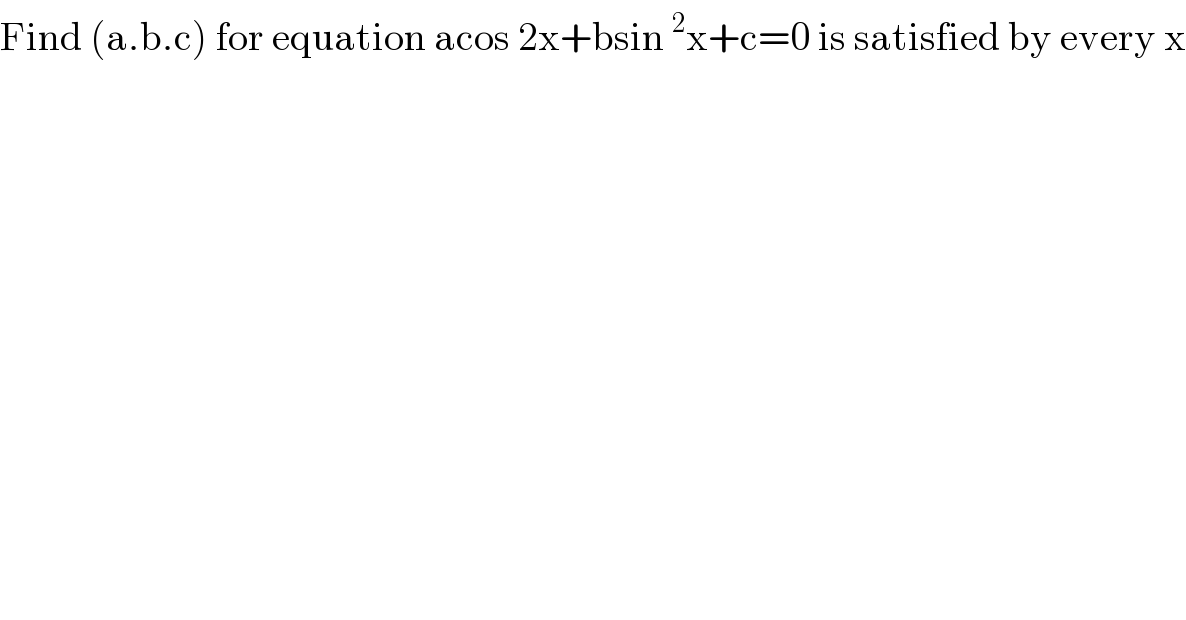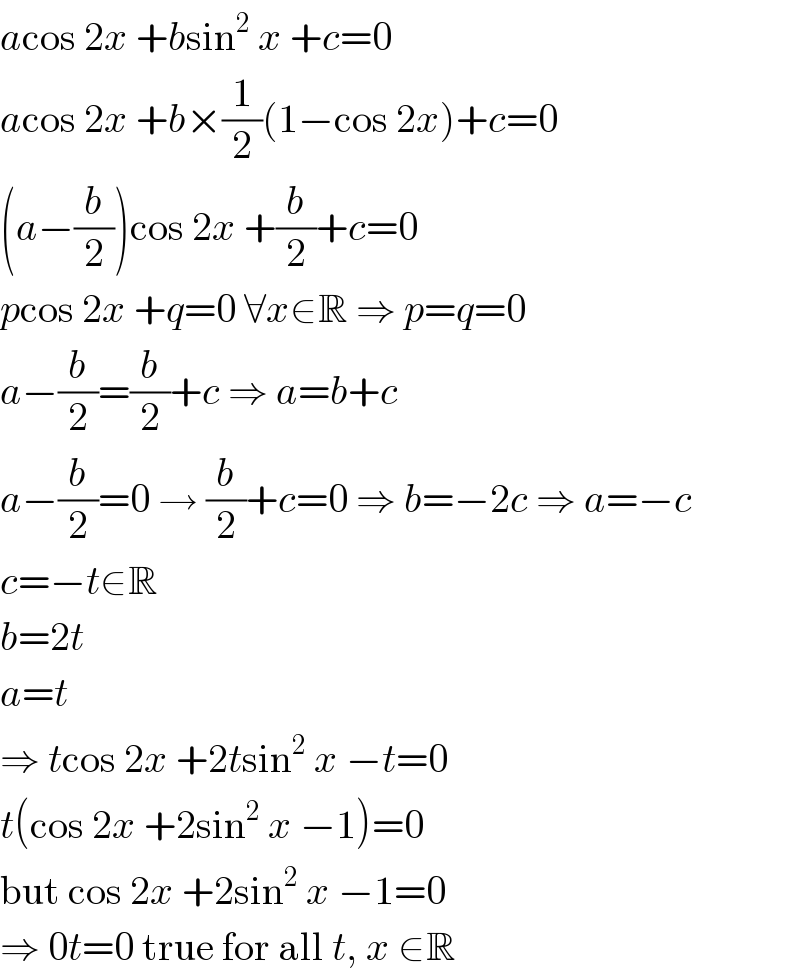
Question Number 76622 by Sathvik last updated on 28/Dec/19

$$\mathrm{Find}\:\left(\mathrm{a}.\mathrm{b}.\mathrm{c}\right)\:\mathrm{for}\:\mathrm{equation}\:\mathrm{acos}\:\mathrm{2x}+\mathrm{bsin}\:^{\mathrm{2}} \mathrm{x}+\mathrm{c}=\mathrm{0}\:\mathrm{is}\:\mathrm{satisfied}\:\mathrm{by}\:\mathrm{every}\:\mathrm{x} \\ $$
Answered by MJS last updated on 28/Dec/19

$${a}\mathrm{cos}\:\mathrm{2}{x}\:+{b}\mathrm{sin}^{\mathrm{2}} \:{x}\:+{c}=\mathrm{0} \\ $$$${a}\mathrm{cos}\:\mathrm{2}{x}\:+{b}×\frac{\mathrm{1}}{\mathrm{2}}\left(\mathrm{1}−\mathrm{cos}\:\mathrm{2}{x}\right)+{c}=\mathrm{0} \\ $$$$\left({a}−\frac{{b}}{\mathrm{2}}\right)\mathrm{cos}\:\mathrm{2}{x}\:+\frac{{b}}{\mathrm{2}}+{c}=\mathrm{0} \\ $$$${p}\mathrm{cos}\:\mathrm{2}{x}\:+{q}=\mathrm{0}\:\forall{x}\in\mathbb{R}\:\Rightarrow\:{p}={q}=\mathrm{0} \\ $$$${a}−\frac{{b}}{\mathrm{2}}=\frac{{b}}{\mathrm{2}}+{c}\:\Rightarrow\:{a}={b}+{c} \\ $$$${a}−\frac{{b}}{\mathrm{2}}=\mathrm{0}\:\rightarrow\:\frac{{b}}{\mathrm{2}}+{c}=\mathrm{0}\:\Rightarrow\:{b}=−\mathrm{2}{c}\:\Rightarrow\:{a}=−{c} \\ $$$${c}=−{t}\in\mathbb{R} \\ $$$${b}=\mathrm{2}{t} \\ $$$${a}={t} \\ $$$$\Rightarrow\:{t}\mathrm{cos}\:\mathrm{2}{x}\:+\mathrm{2}{t}\mathrm{sin}^{\mathrm{2}} \:{x}\:−{t}=\mathrm{0} \\ $$$${t}\left(\mathrm{cos}\:\mathrm{2}{x}\:+\mathrm{2sin}^{\mathrm{2}} \:{x}\:−\mathrm{1}\right)=\mathrm{0} \\ $$$$\mathrm{but}\:\mathrm{cos}\:\mathrm{2}{x}\:+\mathrm{2sin}^{\mathrm{2}} \:{x}\:−\mathrm{1}=\mathrm{0} \\ $$$$\Rightarrow\:\mathrm{0}{t}=\mathrm{0}\:\mathrm{true}\:\mathrm{for}\:\mathrm{all}\:{t},\:{x}\:\in\mathbb{R} \\ $$
Answered by john santu last updated on 29/Dec/19

$${a}\mathrm{cos}\:\mathrm{2}{x}\:+\:{b}\left(\frac{\mathrm{1}}{\mathrm{2}}−\frac{\mathrm{1}}{\mathrm{2}}\mathrm{cos}\:\mathrm{2}{x}\right)=−{c} \\ $$$$\left({a}−\frac{\mathrm{1}}{\mathrm{2}}{b}\right)\mathrm{cos}\:\mathrm{2}{x}=−{c}−\frac{\mathrm{1}}{\mathrm{2}}{b} \\ $$$$\mathrm{cos}\:\mathrm{2}{x}=\frac{−\mathrm{2}{c}−{b}}{\mathrm{2}{a}−{b}}\:\rightarrow\:−\mathrm{1}\leqslant\frac{−\mathrm{2}{c}−{b}}{\mathrm{2}{a}−{b}}\leqslant\mathrm{1} \\ $$$$ \\ $$
